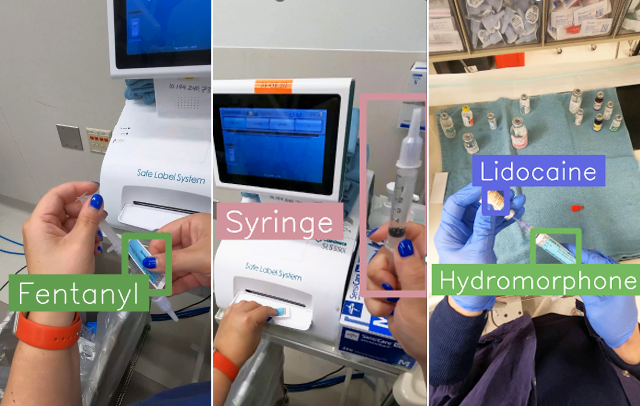Pharma body cams, norovirus vax, Times rips PBMs a new one, and more
24 Oct 2024
Posted by Andrew Kantor
Little Brother to watch you
Cops wear body cameras to help them do their jobs. So what about doctors and pharmacists in ORs and ICUs? Not to record what they do, but fitted with AI to stop them from making a mistake.
University of Washington researchers have developed just that: “the first wearable camera system that, with the help of artificial intelligence, detects potential errors in medication delivery.”
And, as with a lot of what AI does, it’s creepily good. It can identify what medications are being drawn and administered even while clinicians are moving fast — they’re not holding anything up to the camera.
The video system does not directly read the wording on each vial, but scans for other visual cues: vial and syringe size and shape, vial cap color, label print size.
And the AI is good. It “achieved 99.6% sensitivity and 98.8% specificity at detecting vial-swap errors.”

Insurance merger back on the table
They may have cancelled their wedding last year, but Cigna and Humana might be back at the wedding planner, talking about a merger. Well, it’s more that Cigna would assimilate Humana. Cigna is finalizing the sale of its Medicare Advantage business, so it hopes regulators would allow it to buy its smaller competitor once that sale is complete.
mRNA news
Vomit vaccine
Good news for anyone planning a cruise: An international group of researchers has begun stage-3 trials of an mRNA vaccine against norovirus, aka the “vomiting bug.” The trial is set to run for two years and include 25,000 subjects across Australia, Canada, Japan, and the UK.
Even faster vaccines
Developing mRNA vaccines is (as we’ve learned) a lot quicker than developing traditional ones, but there are still bottlenecks, notably synthesizing the mRNA itself. Doing the synthesis requires both a chemical process (fast) and an enzyme-based process (slow). But now Japanese scientists say they’ve found a method* “capable of producing high purity, fully chemically synthesized mRNA.” If it pans out, it could mean faster production of existing mRNA vaccines, and even faster development of new ones.
* As you probably guessed, they “devised a novel phosphorylation reagent with a nitrobenzyl group that serves as a hydrophobic purification tag.”
You’ll like this
The New York Times pulls no punches in its feature on PBMs, “The Powerful Companies Driving Local Drugstores Out of Business.”
[A] New York Times investigation found P.B.M.s, which employers and government programs hire to oversee prescription drug benefits, have been systematically underpaying small pharmacies, helping to drive hundreds out of business.
You knew that already. But take a moment to appreciate the deep dive the Times takes — this was a 3,200-word, front-page story that crosses the country and goes deep into the devastating impact of PBMs on independent pharmacies.
Short takes
Surprising Parkinson’s findings
Rutgers researchers found two unexpected connections between common drugs and the risk of Parkinson’s:
- “[P]eople who took multiple courses of penicillin antibiotics had a 15% lower risk of developing Parkinson’s disease.”
- Those who took antifungal meds, though, “had a 16% higher risk of Parkinson’s.”
Both those findings came out of a review of medical records of more than 93,000 Brits.
Preventing delirium after surgery
There might be a simple solution to post-op delirium — a condition that 15% of surgical patients can get, where they experience confusion that can last a week or more after surgery. That solution? Ibuprofen (or other non-salicylate NSAIDs like celecoxib or ketorolac).
Johns Hopkins researchers found that those non-salicylate NSAIDs were better at heading off delirium than acetaminophen, and way better than aspirin.
The Long Reads: Why you might want to worry about the bird flu
The bird flu, which has been spreading to cows and humans (slowly) doesn’t feel like a big deal — more of a “Meh, keep an eye on it, I guess” situation. But there’s more going on behind the scenes, implying the situation might be a lot worse than we all think.
The bottom line: Rather than help stop the spread in dairy cattle, the USDA is actually blockading testing efforts and information sharing to protect short-term profits.
- Vanity Fair: “Inside the Bungled Bird Flu Response, Where Profits Collide With Public Health”
- Reuters: “Exclusive: State and industry input led US farm agency to relax bird flu testing order for cows”
The good news is that we have a lot of experience with flu vaccines, so hopefully even a major human outbreak would be containable … as long as people get vaccinated.


